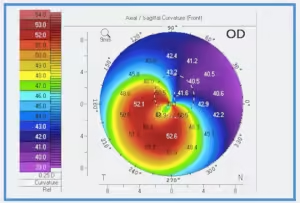

Inherited retinal diseases (IRD) are a group of rare genetic conditions that affect the retina, the delicate tissue at the back of the eye responsible for vision. These conditions are typically caused by mutations in specific genes responsible for maintaining the health and function of the retina. IRD can result in varying degrees of visual impairment, and in some cases, lead to blindness. They can be inherited in several ways, such as dominant, recessive and sex-linked.
The most common types of IRD include Retinitis Pigmentosa (RP), Stargardt disease, Bests Juvenile Dystrophy and others.
The symptoms of IRD can vary widely, even among individuals with the same condition. According to retina specialists, night blindness, tunnel vision, and difficulty distinguishing colours are common early signs. Vision loss is usually slow-progressing. In later stages, central vision may also be affected, impacting simple daily activities like reading and recognising faces. Living with IRD often requires adapting to a changing visual landscape.
Early and accurate diagnosis is pivotal in managing IRD. Electrophysiology testing often helps clarify if IRD is present or not, and genetic testing can help identify specific mutations for an accurate diagnosis and management plan.
Regular visits to an ophthalmologist or retinal specialist, to monitor the progression of the disorder, manage symptoms, and provide support are important. Genetic counselling may also be recommended to understand the inheritance pattern and potential implications for children and family members. Additionally, emerging treatments and clinical trials may be discussed with retina specialists as part of ongoing care.
While there is currently no cure for most IRD, ongoing research holds promise for future treatments. Gene therapy, stem cell therapy and retinal implants are among the innovative approaches being explored to slow or halt the progression of vision loss. Additionally, low vision aids, orientation and mobility training, and adaptive technologies play a crucial role in managing visual challenges and enhancing the quality of life for those affected by IRD.
Support groups and advocacy organizations are valuable resources to connect individuals and families affected by IRD. These communities provide a platform for sharing experiences, accessing resources, and participating in research initiatives that aim to unravel the mysteries of these complex disorders.
IRDs are challenging and often difficult to predict and manage. As science continues to advance, there is hope for improved diagnostics and ground-breaking treatments. Through increased awareness, support networks, and ongoing research, vision loss due to IRD may one day be preventable or effectively managed. It is important for individuals with IRDs to work closely with their healthcare team and retina specialists to address their specific needs and stay informed about available options.
Copyright © 2023 Nexus Eye Care | Trans4m Business Consulting – Website Design & SEO | Privacy Policy | ^